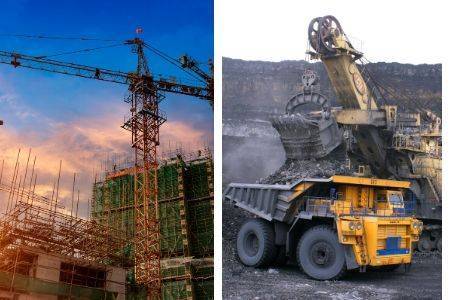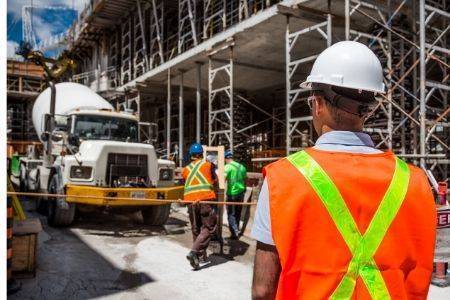Coronavirus and global industry: Impact and post-pandemic actions

"The consultancy firm Capital Economics estimates that the consequences of this virus will cost more than US $ 280,000 million in this first quarter of the year alone. "
The pandemic that we are experiencing today, without a doubt, has impacted the global industry in various ways and at different levels. While some companies have canceled their production, others remain active and even with intense operations and applying remote technology to automate their processes. Here we present a current overview of four main areas of the economy and how COVID-19 and its mutation, SARS-COV-2 or Severe Acute Respiratory Syndrome, have significantly affected the performance of industries on a global scale.
C onstruction and Mining, Between Reactivation and Recession

The International Monetary Fund (IMF) has already anticipated that this and the coming year will be a recession when evaluating the consequences on the economy due to the coronavirus. This statement was made by Kristalina Georgieva , director of this organization, who reported that investors have already withdrawn $ 83 billion from the market, a figure registered as the largest capital outflow ever seen.
Likewise, the consultancy firm Capital Economics estimates that the consequences of this virus will cost more than US $ 280,000 million in this first quarter of the year alone. In Spain, one of the countries hardest hit by the disease, they also analyze the economic situation to come and in the report issued by the Organization for Economic Cooperation and Development (OECD) it is stated that the world economic growth that was projected in a 2.9% , will be reduced by 0.5% for a result of 2.4% . The French economy, says the document, will grow around 0.9% .
To these first approximations and figures is added the fact that China, the country that originated this pandemic, constitutes a pillar in the world economy and the consequences that will be unleashed from trade relations with the so-called giant of Asia will have to be balanced. after the damage that this virus caused in that country.

But in contrast to this vision of recession, for example, the opinion of the company LafargeHolcim, a Swiss producer of materials, arises, who has said that it observes a recovery of the construction sector in China after the pandemic passed. The company plans to supply 70% of the volume of material they made for this same date last year . In fact, plants outside Hubei province are operating again, and China is resuming construction of almost 90% of its 11,000 key projects that include the railway, airport, highway and waterway area. They will also accelerate new infrastructure projects involving 5G networks and data centers.
However, all cases are different, the Swiss company also commented, for Construcción Latinoamericana magazine, that despitethat the construction sector is more resilient than other sectors of the economy, they have experienced interruptions in their operations in other countries and forecast significant decrease and negative impact for the second quarter of this year in some regions where they supply, so they launched an action plan for affected countries.
On the other hand, the large construction and mining equipment manufacturing company such as Komatsu has temporarily closed its plants in Germany, the United Kingdom, Brazil and India, while maintaining operations in China and Japan. In addition to this, it has taken measures against the crisis, among which include teleworking. They claim to be largely unaffected in production thanks to alternate acquisition and reallocation of inventory.
Caterpillar, another of the greats, also evaluates its operations and although it has maintained its activities especially in the US and in other parts where they have been allowed, the company has suspended production in some facilities due to economic conditions that are expressed in low demand. , supply restrictions, government actions and of course the spread of the virus. Cat does not estimate the material impact of this situation, although it will surely perceive it. At the moment, it executes plans that include the use of alternative sources for parts and their redistribution, disinfection of facilities and remote work.
For their part, large German contractor associations continue to work. The Central Association of the German Construction Industry in the words of its president Reinhard Quast, supported by the decree issued by the Federal Ministry of the Interior and Construction (BMI) and the Federal Ministry of Transport and Digital Infrastructure (BMVBS) that allows works of buildings, highway and hydraulic engineering, stated that one of the pillars of the national economy must be maintained because it would contribute to a rapid post-coronavirus recovery and would guarantee the operation of telecommunications, energy and transport, relevant areas. The Federation of German Industry supported this claim, as well as the Association for Medium Construction Companies, which welcomed the news that the dialogue on additional costs would include health protection for workers during the transfer and at work sites while it lasts. this situation.
In other latitudes the picture changes again, because while the construction industry in the United Arab Emirates continues on a regular basis, the European Federation of Construction Industry, which brings together 32 associations from 28 countries, asked the Commission of the European Union to Immediate action for support within these circumstances. Europe has been the second most affected area, especially Italy and Spain.
Mining in Latin America: Case of Peru, Mexico and Chile
In the case of Peru, the mines have health centers and logistics to guarantee operations. They are considered one of the industries most prepared for this type of event, since they have established protocols that involve evacuating the majority of their workers and leaving the essential personnel to ensure the minimum technical operation required and in accordance with government regulations.
 The concern of the Peruvian mining companies lies in the guarantee and transportation of the supplies that require authorization from the ministerios and that have to do with the use of critical materials such as hydrogen peroxide, cement, lime, among others that are required to stabilize the acidity of recycled water into the environment, leach fields, tailings, work in underground mining, construction continuous of containment dams or diversion channels.
The concern of the Peruvian mining companies lies in the guarantee and transportation of the supplies that require authorization from the ministerios and that have to do with the use of critical materials such as hydrogen peroxide, cement, lime, among others that are required to stabilize the acidity of recycled water into the environment, leach fields, tailings, work in underground mining, construction continuous of containment dams or diversion channels.
Large projects have temporarily ceased operations, such as Quellaveco and Mina Justa, two copper projects under construction.
This complex scenario has not only brought limitations to the usual tasks of mining production, but also brings about the drop in the price of copper, which is around 2.20 dollars per pound, a price that has not reached since 2008. This will affect the Peruvian economy in a way negative.
The Mexican case is not far from that of Peru, so decisions will have to be made for a future that is already here. Investors will have to be found and China will be at the top of the list as evidenced by its participation in the world's largest lithium mine recently discovered in Sonora. They are also considering establishing clearer rules on the inclusion of technological advances in extraction, logistics and distribution operations.
In the case of Chile where global giants such as the state-owned Codelco, BHP, Anglo American, Glencore, Freeport and Antofagasta operate , the work has decreased and in some mines operations have been halted due to contagion by some workers, among other difficulties. Such is the case of a worker from the contractor company Sigdo Koppers who was serving in the Codelco Andean Transfer.
However, until now, Chilean mining, although with safeguards for the health of its workers, has maintained its operations.
As well as it will affect the drop in the price of copper and the limitations in the tasks; stopping investments and the uncertainty of certain projects to be carried out will have unemployment consequences.
It should be noted that although the price of red metal has accumulated a 19% drop this month, the health crisis and the lower demand for copper by China, the US and Europe will continue to affect the decrease in raw material prices. . Investment bank Goldman Sachs estimates that a 10% drop in these prices would decrease Chile's GDP by 1.3%.
As China moves away from the pandemic (a fact that is already being observed) and supply and demand are solved, the economy could begin to reactivate and become one of the main consumers of Chilean copper.
Agroindustry Unstoppable and with Strict Security Protocols
This sector faces an immense responsibility in the face of this crisis since the planet's food security rests on its shoulders. Due to this, it intensifies its activity to ensure supply in the face of the crisis.
The European Food Safety Authority (EFSA) has explained that there is no evidence that food is a vehicle for transmission of the virus and activity in this area continues to emphasize the activation of protocols for workers in this sector.
= "line-height: 150%; text-align: left;"> It must be taken into account that the use of technology in all the links of the agro-industrial chains, from production in the field to processes in the processing plants , it is a favorable attribute in terms of biosecurity and in many countries it is guaranteed.
In the case of Argentina, it is one of the countries that has a higher rate of grain production per individual worker, which reduces the risk of contagion.
The same occurs in ports, where processes are automated, although precautions are being taken to avoid compromising the entry of foreign currency, since the threat is perceived in markets where soybean meal (one of the main Argentine export products) is going up for fear of complications in shipments from the ports of Paraná, where the processing companies are located.
The other difficulties that arise are land transportation for export, which are affected by not being able to transit with products such as rice, fruits and vegetables until they comply with the corresponding security protocols.
The important change in the long term will be for the benefit of some sectors or countries that start exporting products that China used to export and that other countries could now be included in that market.
This intense activity in the agro-industrial sector to ensure supply has seen an increase of 30 to 40% in the demand for basic necessities and up to a demand of two or three times more for specific products.
The AIAA or Association of Food Industries of Aragon has stated that specific protocols are being implemented to reduce the risks of contagion among workers to avoid the closure of facilities and continue to ensure food. Among the protocols, a measure already seen among companies in the food industry is teleworking for operations that allow it.
For its part, the Food and Drug Administration (FDA) of the United States pays special attention to the possible challenges that the virus could present. The agency is aware that the outbreak is likely to affect the product's supply chain, including possible disruptions to suppliers.
In the Venezuelan case, the Venezuelan Chamber of the Food Industry (Cavidea) activated the emergency plan designed to address social or natural situations, for which reason, they urged the "food manufacturing industries, affiliated with the chamber, to continue working normally, to produce food and contribute to food security, as well as comply with protocols established by health authorities in order to protect and support employees and workers in their respective work areas. ” The Vice President of Economy, Tareck El Aissami, who made this call, also expressed that he will be exempt from taxes and customs duties on imports of raw materials so that strategic industries such as agribusiness, the pharmaceutical industry or another of vital importance can acquire the necessary inputs to maintain production.
The companies in this much-needed area apply their action protocols, which include the implementation of measures to guarantee health, control of the spread of the virus, accompaniment of established social measures and guarantee of food supplies to lessen the impact in all ways. economic.
Transportation also suffers
ext-align: left; "> Not only do large manufacturing companies of all types of transportation suffer under this crisis, ports, airports and vehicular traffic controls have slowed down their activities, remaining almost exclusively for the essential activities of the economy, mainly the transport of food and medical supplies until this pandemic passes.The restrictions have affected the supply chains of large companies, such as the industrial equipment manufacturer JCB and the vehicle company Nissan.
Auto sales in China also fell 86% in February, and more and more manufacturers, such as Tesla and Geely, are selling their vehicles using the internet, even though their factories are in basic operations.
For its part, the International Air Transport Association (IATA) predicted that airlines will lose US $ 29.3 billion in 2020 as a result of the coronavirus. When they believed that the relaxation of tensions between the United States and China would improve the behavior of the sector, the pandemic became. To this is added that in January of this year the volumes of air cargo also fell 3.3% and in continuation of the ten consecutive months that it has been declining.
Meanwhile in Central America, the Panama Canal adopted a series of measures to protect itself. These include the registry of countries visited before arriving at the channel, information on conditions on board personnel, inspections of the crew, questioning of the captain or officer in charge, and if any suspected or confirmed case is observed, the Maritime Health of the Ministry of Health of Panama (MINSA) and the ship is placed in quarantine.
All this brief overview described in a condensed way and brushstrokes allows us to glimpse that a redefinition of the industry must be contemplated when before and activated from now on, and not only from the point of view of how the processes that have appeared with telework will be handled and the automation of processes where machines and computers can substitute tasks. The pandemic, in its positive aspect, is already raising questions about the type of society we want to build post-coronavirus , the contribution of different actors to collective well-being, and the need for other business models that promote sustainable development. Soon we will have to make important decisions, so more than ever we will have to think of solutions and structures that lead us to a harmonious society.
Each country has been assuming it from its government perspective, either predatory or on the contrary, with a global solidarity position. What if we must be clear is that we must catch other reflections and arguments rather than the virus.
Check here the worldwide impact of the Coronavirus hour by hour.

